

Holoptisme - [ ] Temple of Poi. Jean-François Noubel : "C'est quoi l'Holoptisme ?" (Expérience à Paris le 12 juin 2009) HOLONS, TRANSVERSALS and NARRATING. HOLON AND TRANSORGANIZATION THEORYBy David Boje September 30, 1999, Last Revision September 8, 2000.
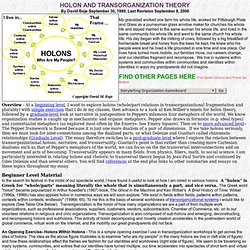
Holopticism. Holon (philosophy) A holon (Greek: ὅλον, holon neuter form of ὅλος, holos "whole") is something that is simultaneously a whole and a part.
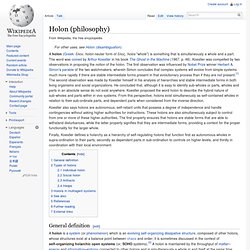
The word was coined by Arthur Koestler in his book The Ghost in the Machine (1967, p. 48). Koestler was compelled by two observations in proposing the notion of the holon. The first observation was influenced by Nobel Prize winner Herbert A. Simon's parable of the two watchmakers, wherein Simon concludes that complex systems will evolve from simple systems much more rapidly if there are stable intermediate forms present in that evolutionary process than if they are not present.[1] The second observation was made by Koestler himself in his analysis of hierarchies and stable intermediate forms in both living organisms and social organizations.
Holarchy. Different meanings[edit] David Spangler uses the term in a different meaning: "In a hierarchy, participants can be compared and evaluated on the basis of position, rank, relative power, seniority, and the like.
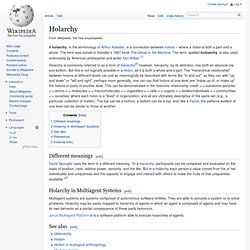
But in a holarchy each person’s value comes from his or her individuality and uniqueness and the capacity to engage and interact with others to make the fruits of that uniqueness available. "[3] Holarchy in Multiagent Systems[edit] Multiagent systems are systems composed of autonomous software entities. Janus Multiagent Platform is a software platform able to execute holarchies of agents. Holisme. Holisme (du grec ancien ὅλος / hólos signifiant « entier ») est un néologisme forgé en 1926 par l'homme d'État sud-africain Jan Christiaan Smuts pour son ouvrage Holism and Evolution[1].
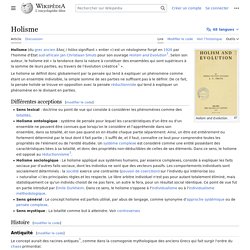
Selon son auteur, le holisme est « la tendance dans la nature à constituer des ensembles qui sont supérieurs à la somme de leurs parties, au travers de l'évolution créatrice[1] ». Le holisme se définit donc globalement par la pensée qui tend à expliquer un phénomène comme étant un ensemble indivisible, la simple somme de ses parties ne suffisant pas à le définir. Holism. For the suffix, see holism.
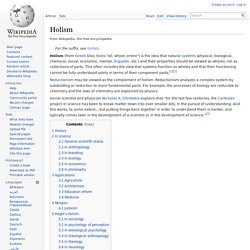
Holism (from Greek ὅλος holos "all, whole, entire") is the idea that natural systems (physical, biological, chemical, social, economic, mental, linguistic, etc.) and their properties should be viewed as wholes, not as collections of parts. This often includes the view that systems function as wholes and that their functioning cannot be fully understood solely in terms of their component parts.[1][2] Reductionism may be viewed as the complement of holism. Reductionism analyzes a complex system by subdividing or reduction to more fundamental parts. For example, the processes of biology are reducible to chemistry and the laws of chemistry are explained by physics. Holism versus Reductionism. Holism and Evolution. Un article de Wikipédia, l'encyclopédie libre.
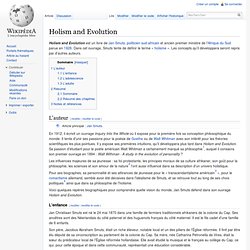
Holism and Evolution est un livre de Jan Smuts, politicien sud-africain et ancien premier ministre de l'Afrique du Sud parue en 1926. New Civilization News: Holocracy. 25 Jan 2002 @ 02:31, by Flemming Funch In trying to figure out what democracy really is and how it might work, I notice in the dictionary that the ending -cracy signifies "rule" or "government" by the agent specified by the initial element.
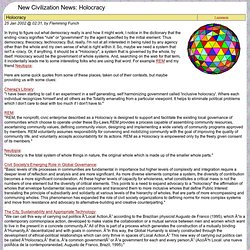
Thus democracy, theocracy, technocracy. But, really, I'm not at all interested in being ruled by any agency other than the whole and my own sense of what is right within it. So, maybe we need a system that isn't a -cracy. HoloWorld. New Work Paradigm: Holistic Generativity. One of the things I've been most passionate about on my own work for many years is focusing my energy toward the emerging paradigm of work, one where financial generatively (making money) is only part of the whole and not, as in the conventional paradigm, the central bottom line...or even the only driving bottom line.

The new paradigm has multiple bottom lines; multiple ways of creating and engaging; and includes new ways of being and interacting as well as doing and acting. It requires an entirely new foundations, not just new ways to "succeed" in the old foundational landscape. There is a larger movement of integration underfoot, and more and more people are committed to helping bring this new life-giving work paradigm forward. It is already happening. We can focus on creating/unfolding a better future - leaving that which no longer serves, "yes-anding" what does - or we can carry the baggage of the past and be limited by what worked then. Holarchy & integral pdf. High Performance Via Holacracy - Organization at the Leading Edge. High Performance Project Processes supported by HolacracyÔ Structures HolacracyOne- Organization at the Leading Edge: Introducing Holacracy™ By Brian J.
Robertson. Holarchies. By Flemming Funch, 4 Feb 95.
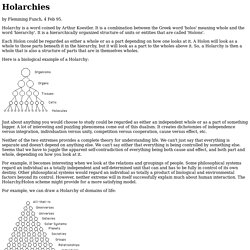
L'Excellence en Holacracy™ - IGI Partners. Ltec. Holacracy: Organization evolved (in french) Sociocracy: Contrasting Paradigms. There is a newer video with Brian Robertson and Bernard Marie Chiquet discussing the differences and similarities between Holacracy and Sociocracy.
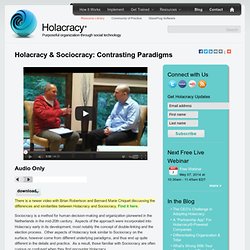
Find it here. Sociocracy is a method for human decision-making and organization pioneered in the Netherlands in the mid-20th century. Aspects of the approach were incorporated into Holacracy early in its development, most notably the concept of double-linking and the election process. Other aspects of Holacracy look similar to Sociocracy on the surface, however come from different underlying paradigms, and thus end up quite different in the details and practice.
As a result, those familiar with Sociocracy are often curious or confused when they first encounter Holacracy. Democracy and Holistic Politics. Co-intelligence is the capacity to live well WITH each other and life, creatively using diversity and uniqueness, consciously evolving together in partnership with nature, and consciously transforming culture. Co-intelligence is intrinsic in all living systems and can always be improved. Use it for organizational development, better family relations, community renewal, and creating a more just, democratic and sustainable society. The Co-Intelligence Institute's. Holocracy/Sociocracy « Open Integral. Holonx. The holon, a new way to look at hierarchies. Liberating the soul of organizations. Questioning Holacracy One’s Integrity. Image by Improve It via Flickr I trusted Holacracy One (HO) to deliver on it’s promise of learning and experience during its 5-day Certification Training for which I paid $3,495.00.
It didn’t. I asked for a refund, they refused. This blog post sets up the next one that shares the email exchanges, revealing the character of the organization with regards to the customer experience. Hierarchy is dead! Long live Holacracy! …Right? “Sexual freedom, sexual liberation. A modern delusion. We are hierarchical animals.
Sweep one hierarchy away, and another will take its place, perhaps less palatable than the first.” ― Camille Paglia Hold on to that quote… Holacracy visualized - Training and Implementation in Germany. Holacracy™ explained visually – a new practice of structuring, leading and governing an organization. It represents a ‘new operating system’, that fosters rapid development self organization. HolacracyOne writes: Over the past two decades, dozens of thought-leaders have pointed the way to new capacities organizations must develop to thrive amidst our 21st century challenges. Gouvernance. Livepreview. Holonic map.
A holonic map is a fractal map of perceptions represented as holons, forming a holarchy of perceptual information. Within a holonic map each object of perception, colloquially referred to as a 'thought' or a 'thing', is represented by a holon, which can contain other holons. The holonic map is able to store and communicate subjective and inter-subjective information, and therefore by function of the human nervous system abstractions of 'objective' information.[1] Any perceptual object of attention can potentially be represented as a holon within a holonic map. History[edit] The concept of a holonic map and holonic mapping was invented in 2011 by Chris Larcombe in an attempt to bring systems thinking and holistic systemic perception to a wider audience, in addition to providing a platform for expanding individual and collective perception of the environment through the process of sharing perceptions.
Mapping Systems[edit] Collabortive Holonic Mapping[edit] Holonic Mapping Technology[edit] HOLOS GLOBAL SYSTEM. Being in itself is the force. The action of being is the manifestation of its force. The force depends on the form while the aim of the action is an even greater force. Action in itself liberates the force. Every reactive action provokes other actions. Holisme. Définition Le holisme (du grec holos, tout) est l'idée selon laquelle les propriétés d'un système ne peuvent être déterminées ou expliquées à partir des seuls composants du système.
Ce mot fut inventé par l'homme politique et intellectuel sud-africain Jan Christiaan Smuts (1870–1950) qui le définissait comme la tendance dans la nature à former des touts plus grands que la somme de leurs parties grâce à l'évolution créatrice (on parlerait aujourd'hui de la propriété d'émergence). Holism in science. Holonic system .png. Définition Holisme - Encyclopédie scientifique en ligne. Holistic management. Organize your Holon. How to Organize Your Holon Congratulations! HOLONS, TRANSVERSALS and NARRATING. Arthur Koestler, Some general properties of self-regulating open hierarchic order (1969) A Brief History of Holons, Mark Edwards. Wednesday, April 16, 2014. Schools of postmodernism. (1) La Réalité en tant que tout n'est pas composée de choses, ou de processus, mais de holons.